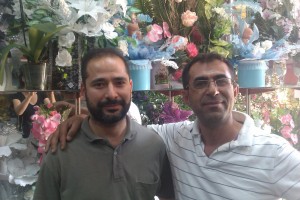(Dit verhaal schreef ik voor een Engelstalige site. Ik heb geen tijd het in het Nederlands te vertalen, sorry.)
Nearly two weeks after the car bomb in Gaziantep, locals share mixed views of the “city of peace” and tolerance.
The shattered pavement, local shop owners say, was repaired the day after a car bomb exploded on Koruturk Street in central Gaziantep on August 20th, leaving 10 dead and nearly 70 wounded. But not everything could be fixed so quickly: some windows are still broken and a few buildings are still being restored.
“The bomb,” said Imran Akar, “brought us closer together.” Akar, a Kurd from the southeast province of Siirt, works in a flower shop on Koruturk Street with his colleague Bayran Kanbur, a Turk. As they prepared a yellow flower bouquet, the two said that they feel no animosity toward each other because of the bombing.
“Many different groups live in this city. We go to the same mosques, we live in the same neighbourhoods, we greet each other on the street. We are all religious and religion forbids discrimination,” Akar told SES Türkiye.
“Of course,” added Kanbur, “politicians fight over who is responsible for the bomb and try to gain from it, but we just don’t play along with their games.” Preferring to not talk much more about the bombing, Kanbur said the two colleagues may have different opinions about who did it and why. That could lead to arguments and we don’t want that.”
While Akar and Kanbur refrain from discussing what could tear them apart, in a street located around the corner from the provincial BDP office that was torched after the bombing by a mob of Turkish nationalists, a group of neighbours speak in Kurdish.
Among them is Sabiha, 52, whose brother is in jail. “He was caught with seven explosives in his car,” Sabiha said, refusing to give her last name and preferring to talk inside her home.
“The neighbours shouldn’t hear me. We are all Kurds here, but some of them are assimilated and I’m not sure if I can trust them,” she said inside her home. Her brother was sentenced to a long prison sentence six years ago, she said.
“As far as we know, he acted on his own. He has never talked about what he intended to do.” The only thing she knows is that what her brother did is “günah,” a sin. “Just like the bombing here two weeks ago, Allah doesn’t allow it.”
Kurdish population
Gaziantep is referred to as a tolerant city, or even a “city of peace,” because it has never been confronted with terrorist attacks before. But it is not only that explains Orhan Kemal Cengiz, a lawyer and human rights activist.
“In Gaziantep several groups live together. But there is no serious tension between the groups like you see in other cities where the Kurdish population has grown due to immigration, like in Mersin or Izmir. In those cities, you have not only Kurdish immigrants, but also many nationalist Turks, and it can be explosive if these two come together,” Cengiz told SES Türkiye. ”The people behind the bomb, whoever they were, want direct confrontations between Kurds and Turks. Luckily that didn’t happen in Gaziantep. The city kept its calm,” Cengiz added.
In Gaziantep, the nationalist MHP is not among the biggest parties, neither is the other end of the political spectrum, the pro-Kurdish BDP. Many Kurds vote for the AKP, or CHP if they are Alevi. But to call Gaziantep a ‘city of peace’ because of that is a step too far, according to Cengiz. “I don’t think there is such a city in all of Turkey. This country had so many conflicts in its history and none of them have been faced. That needs to be done before you can speak of real peace.”
Underneath the surface
Hasan Yilmaz, 32, couldn’t agree more. He works for a bank, but in his free time he writes about the news as a citizen journalist on his own Tumblr-page. He felt a need to write about the city where he was born and raised: “I read in the papers about the tolerance in Gaziantep, but I don’t recognise my city with that description,” he told SES Türkiye.
“On the outside,” Yilmaz said, “there is no trouble, but underneath the surface there is. Kurds are being discriminated against. They are underpaid, excluded, and cursed. The biggest complaint is that the Kurdish immigrants ‘ruined the city,’ I know, I am a Turk, I hear it around me all the time.”
Yilmaz also referred to the Armenians and Jews that lived in the city until the 1920′s and 1970s, but who were forced out or left due to rising pressure against minorities in the whole of Turkey. “So if you ask me if Gaziantep, city of peace, will change because of the bomb blast, I say it never was a city of peace to begin with.”



Recente reacties